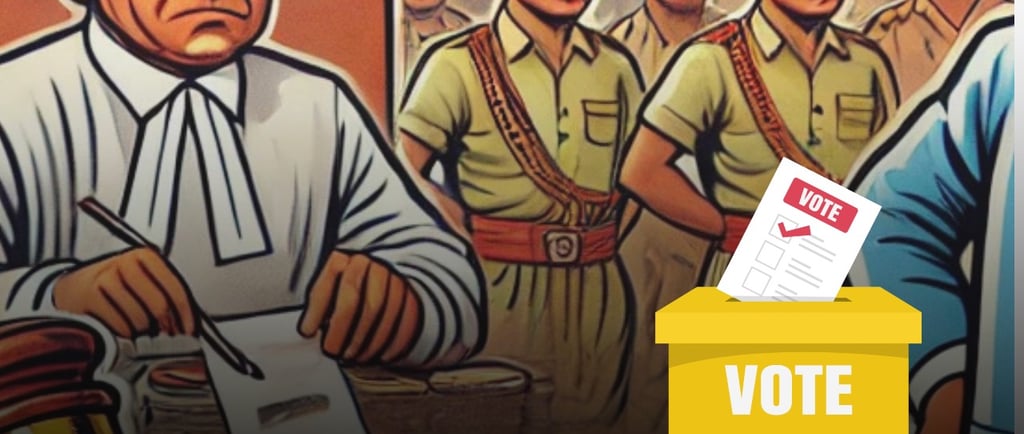Supreme Court Orders Recount in Disputed Uttar Pradesh Panchayat Election
Landmark Judgment Restores Order for Vote Recount, Ensuring Electoral Transparency In a significant ruling on March 6, 2025, the Supreme Court of India overturned a High Court judgment and reinstated an order for recounting votes in the Gram Pradhan elections of Village Chaka @ Chak, Saidabad, Tehsil Handia, District Prayagraj, Uttar Pradesh. The judgment, delivered by Justices Sanjay Karol and Nongmeikapam Kotiswar Singh, emphasized the importance of electoral integrity and transparency, reaffirming that the sanctity of each vote must be preserved.
3/7/20253 min read


Background of the Case
The case originated from a dispute between two electoral candidates—Vijay Bahadur, the appellant, and Sunil Kumar, the respondent—over alleged discrepancies in vote counting during the 2021 Panchayat elections. Bahadur contested the election results, claiming irregularities in the tallying of votes from polling booths 43, 44, and 45.
According to Bahadur, the Presiding Officer initially informed him that 1,194 votes had been cast in these booths. However, the final official tally under 'Form 46' reflected a total of 1,213 votes—a difference of 19 votes. Given that the margin of victory was only 37 votes, Bahadur suspected foul play and sought a recount.
Legal Proceedings
Following the disputed election results, Bahadur filed a complaint with the Election Officer, alleging that his votes were illegally canceled at specific counting tables and that additional votes had been fraudulently added. However, his request for a recount was denied.
Subsequently, he filed an election petition under Section 12-C(1) of the Uttar Pradesh Panchayat Raj Act, 1947, before the Sub-Divisional Magistrate (SDM). The SDM, after reviewing testimonies and evidence, ruled in favor of Bahadur on October 31, 2022, and ordered a recount of votes at the disputed polling booths.
Kumar, the declared winner, challenged the SDM’s order by filing a revision petition. The revisional authority upheld the SDM’s decision. Dissatisfied, Kumar approached the Allahabad High Court through a writ petition.
On January 27, 2023, a Single Judge Bench of the Allahabad High Court set aside the recount order, stating that Bahadur had failed to provide substantial documentary evidence of discrepancies. The High Court emphasized the principle of maintaining the secrecy of ballots and ruled that a recount could not be granted on vague allegations.
Supreme Court’s Analysis and Ruling
Bahadur then appealed to the Supreme Court, arguing that:
The SDM’s decision was based on well-established precedents allowing a recount when substantial irregularities are demonstrated.
The High Court erred in rejecting the recount request despite compelling evidence.
The integrity of the electoral process must be upheld, especially in cases where the margin of victory is narrow.
The Supreme Court, after reviewing legal precedents and the case facts, ruled in favor of Bahadur, holding that a recount was justified. The Court observed that:
Discrepancy in Vote Count: The difference in vote count (1,194 vs. 1,213) raised legitimate concerns.
Missing Election Records: Key election documents, including the ‘Matpatra Lekha’ and the Presiding Officer’s diary, were missing, preventing verification of the original count.
Majority of Candidates Raised Concerns: Three of the four contesting candidates questioned the legitimacy of the results, strengthening the case for a recount.
Use of Force Against Appellant: Evidence suggested that Bahadur was forcibly removed from the polling area, further casting doubts on the fairness of the process.
The Court reiterated that while secrecy of the ballot is crucial, it cannot be used as a shield to protect fraudulent election practices. Citing multiple precedents, including Ram Sewak Yadav v. Hussain Kamil Kidwai (1964) and Vadivelu v. Sundaram (2000), the Court emphasized that a recount should be ordered if there is prima facie evidence of manipulation.
In conclusion, the Supreme Court set aside the High Court’s judgment and restored the SDM’s order, directing an immediate recount of votes at the three disputed polling booths.
Implications of the Judgment
The Supreme Court’s ruling is a landmark decision reinforcing the judiciary’s role in upholding electoral fairness. The judgment underscores the following key principles:
Electoral Integrity: The ruling affirms that every vote must be counted accurately and that election officers must ensure transparency.
Right to Legal Redress: Candidates have the right to challenge electoral malpractices, and courts must take allegations of fraud seriously when supported by prima facie evidence.
Precedent for Future Cases: The verdict sets a precedent for future election disputes, ensuring that courts take a stringent approach toward vote count discrepancies.
The Supreme Court directed the High Court Registrar General to communicate the ruling to the concerned SDM for the recount process to be initiated at the earliest.
As India continues to strengthen its democratic processes, this judgment serves as a reminder that even the smallest electoral irregularities will not be ignored. The case is expected to have lasting ramifications, especially in local governance elections where vote margins are often narrow, and disputes are common.
